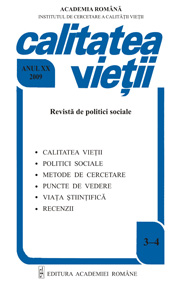

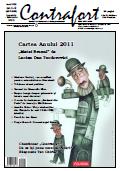
Vă rugăm să alcătuiți un top din cinci titluri (dispuse în ordine valorică) al cărților din literatura română contemporană, inclusiv volume semnate de autori din Basarabia, apărute în 2011. Motivați alegerea primului titlu din acest clasament printr-o scurtă apreciere (maximum 300 de semne).
More...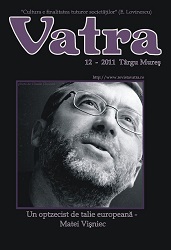
Acţiunea şi prezenţa critică a lui Al. Cistelecan au fost percepute, în timp, în fel şi chip, accentul aşezându-se când pe rigoare şi exactitate, pe comprehensiune şi pe darul disocierilor, când pe spectacolul stilului ironic sau pe expresivitatea calofi lă a discursului. Nicolae Manolescu, în Istoria critică a literaturii române, reţine, între calităţile criticului Al. Cistelecan, „fi neţea antenelor”, distilarea sarcasmului, dar şi scriitura „plastică, barocă, de o tehnicitate ce nu-şi poate reprima apetenţa către mimarea parodică (caragialiană şi paulgeorgesciană) a limbajului, jargoanelor şi pronunţiilor pitoreşti”. Cronicile lui Al. Cistelecan, „inteligente, sclipind de ironia ideii şi savuroase stilistic” îndeplinesc, precizează Manolescu, „condiţiile excelenţei critice şi stilistice”, în ciuda unui risc al calofi liei. Autorul Istoriei critice… concluzionează: „Există puţini critici de poezie capabili de comprehensiunea şi de
More...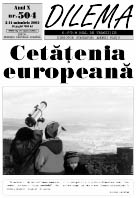
Keywords: European Integration Process
Virgil Ştefan Niţulescu writes a short but comprehensive history of the European Integration Process, starting from the Jean Monet ideas in this area of interest and reaching the nowadays facts and evolution. The journalist suggests that the process of a large Europe was often difficult, but the results are impressive.
More...
Keywords: European Integration Process; new meanings of "freedom"
Cornel Codiţă suggests that the first stage of the European integration process it is almost done, but now is very important the second stage: the consolidation of political and legislative institutions. One of the most important issues is the "freedom" concept. This gets new interpretations and has more aspects to be solved in a large unique Europe.
More...
Keywords: being European;
Victor Julian Tucă vrites an interesting essay on European citiyenship, as it was shown in Maastricht Treaty (1991). The columnist considers that there is no need to be so very exciting for the ones who believe that to be European is more than to be your own country citizen. This is why it is very important for all the Romanians who expect to be Europeans in 1997 to know the law.
More...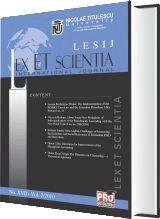
Keywords: discretionary power; power excess; subjective right; principle of lawfulness; principle of proportionality constitutional law
A problem of essence of the state is the one to delimit the discretionary power, respectively the power abuse in the activity of the state’s institutions. The legal behavior of the state’s institutions consists in their right to appreciate them and the power excess generates the violation of a subjective right or of the right that is of legitimate interest to the citizen. The application and nonobservance of the principle of lawfulness in the activities of the state is a complex problem because the exercise of the state’s functions assumes the discretionary powers with which the states authorities are invested, or otherwise said the ‘right of appreciation” of the authorities regarding the moment of adopting the contents of the measures proposed. The discretionary power cannot be opposed to the principle of lawfulness, as a dimension of the state de jure. In this study we propose to analyze the concept of discretionary power, respectively the power excess, having as a guidance the legislation, jurisprudence and doctrine in the matter. At the same time we would like to identify the most important criterions that will allow the user, regardless that he is or not an administrator, a public clerk or a judge, to delimit the legal behavior of the state’s institutions from the power excess. Within this context, we appreciate that the principle of proportionality represents such a criterion. The proportionality is a legal principle of the law, but at the same time it is a principle of the constitutional law and of other law branches. It expresses clearly the idea of balance, reasonability but also of adjusting the measures ordered by the state’s authorities to the situation in fact, respectively to the purpose for which they have been conceived. In our study we choose theoretical and jurisprudence arguments according to which the principle of proportionality can procedurally be determined and used to delimit the discretionary power and power abuse.
More...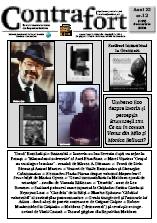
Keywords: poetry;
The author revues here two volumes of poetry Gheorghe Calamanciuc’s "Toamnele lui Adam" (Adam’s Autumns) published in Timisoara by the Artpress Publishing House and Valeriu Matei’s "Grecia imaginara" (Imaginary Greece) published by Mesagerul Publishing House in Chisinau.
More...
Keywords: democracy;
The post communist countries’ strive to become democracies is not always an easy process.Some countries succeeded in making crucial steps towards a democratic society and leave behind the grey period of transition from the communist totalitarism. The author gives the examples of Romania and Ucraine where despite all obstacles,democratic forces won in the elections. Moldavia has now in these two countries, allies in her struggle against ex communists.
More...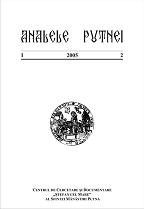
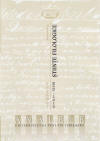
Keywords: postmodernism; “fracturism”; Romanian contemporary literature; Moldavian contemporary literature; social structures
The changes recorded in politics but also in the socio-cultural area post-1989 have influenced both Romanian and Moldavian literature. The year 2000 marked the makings of a new literary generation in Romanian literature and, within it, the birth of a new literary group called “fracturism”, created by the writers Dumitru Crudu and Marius Ianuş. Bringing together, on the one side, the Romanian young writers, and, on the other, young writers from the Moldavian Republic, this literary group has forged a new type of novel, based upon an anarchist attitude and rebellion against every social structure that constrains the individual’s voice. While the writers from the previous generations (the eighties or the nineties) used their work to rebel against an oppressive political regime, the new writers now use theirs to stand against the commercial vision of life and against the demise of individuality in today’s society. The deconstruction of social structures is achieved in their novels by using violent imagery and language, by exploring the ugliness and coldness of the everyday life with all its hidden and dark sides: from poverty to historical drama, from the destruction of the private space and intimacy to the surrender of this intimacy to a strict surveillance enacted in the social dimension.
More...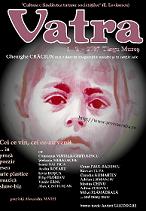
Keywords: Mircea Cartarescu; Cleopatra Stratan; OTV; Alexandru Vakulovski; Vasile Ernu;
Cultural dossier. Section containing comments of artistic genre representatives, about the most important debuts in the last three years.
More...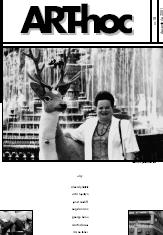
“AUTOFOTOGRAFIE” - Maria Gălie at Teatrul ACT, Bucuresti , 19 Oct 2002. Presentation of the Venetian film festival; Jan Saudek's photography;
More...Essay.
More...Keywords: contemporary politics and parties in Moldova;
More...Keywords: structural funds; EU; Romania
The aim of present study is to give an insight into the current status of the use of European Union structural funds in Romania. For this reason it presents the EU programme and funds information in Romania, defi ning those Operational Programmes and the sums of money associated to them, through which benefi ciaries can get supports from EU structural funds. After that the notion of absorption of the mentioned funds is defi ned. In this context, some possible explanations of the low level of the absorption ratio are indicated. Finally the ratio is calculated according to values from April 2013 and the annual absorption ratio is defined.
More...Keywords: communication; uncertainty; silence; uncertainty inductor
The study explores the silence as communicational element and as autonomous message; also, highlights its specificity as an inductor of uncertainty. Thesis that silence radiating uncertainties is proved by using the comparative method and procedures of natural logic and erotetic logic. From the comparison between word and silence follows some characteristic notes of silence: a) the silence is an element without accredited code (there is not a coherent and usable code of silence); b) mostly silence is not only element of communication, but autonomous message; c) the fact that peace is a property of nature and the silence is intentional human element; d) the fact that silence is no speech, logos, discourse, it is an incomplete and expressive "language"; e) that silence is the most important communicational element and uncertainty message inductor.
More...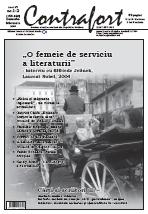
Postmodernism in the Romanian litarature after 2000: 1) Ion Manolescu, Videologia, Iaşi, Editura Polirom, 2003, şi Noţiuni pentru studiul textualităţii virtuale, Bucureşti, Editura Ars docendi, 2002 2) Cosana Nicolaie, Canon, canonic, Bucureşti, Editura Univers enciclopedic, 2006 3) Lucia Simona Dinescu, Corpul în imaginarul virtual, Iaşi, Editura Polirom, 2007 4) Virgil Nemoianu, Th e Hospitable Canon. Essays on Literary Play, Scholarly Choice , and Popular Pressures, Philadelphia: J. Benjamins Pub. Co.,1991 5) Florina Ilis (pe numele ei adevărat Iliş) este autoarea romanelor Coborîrea de pe cruce, Cruciada copiilor şi Cinci nori pe cerul de răsărit.
More...